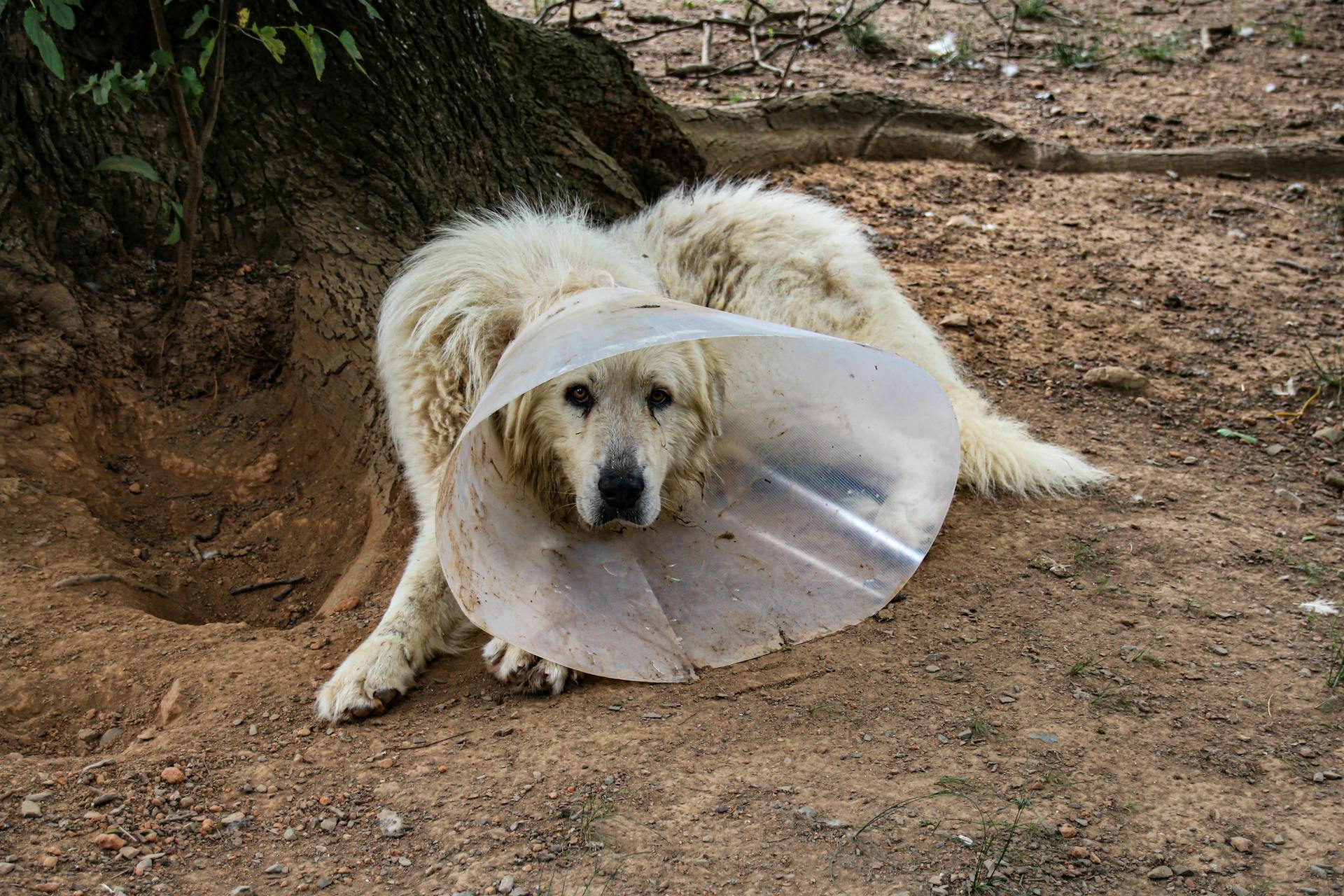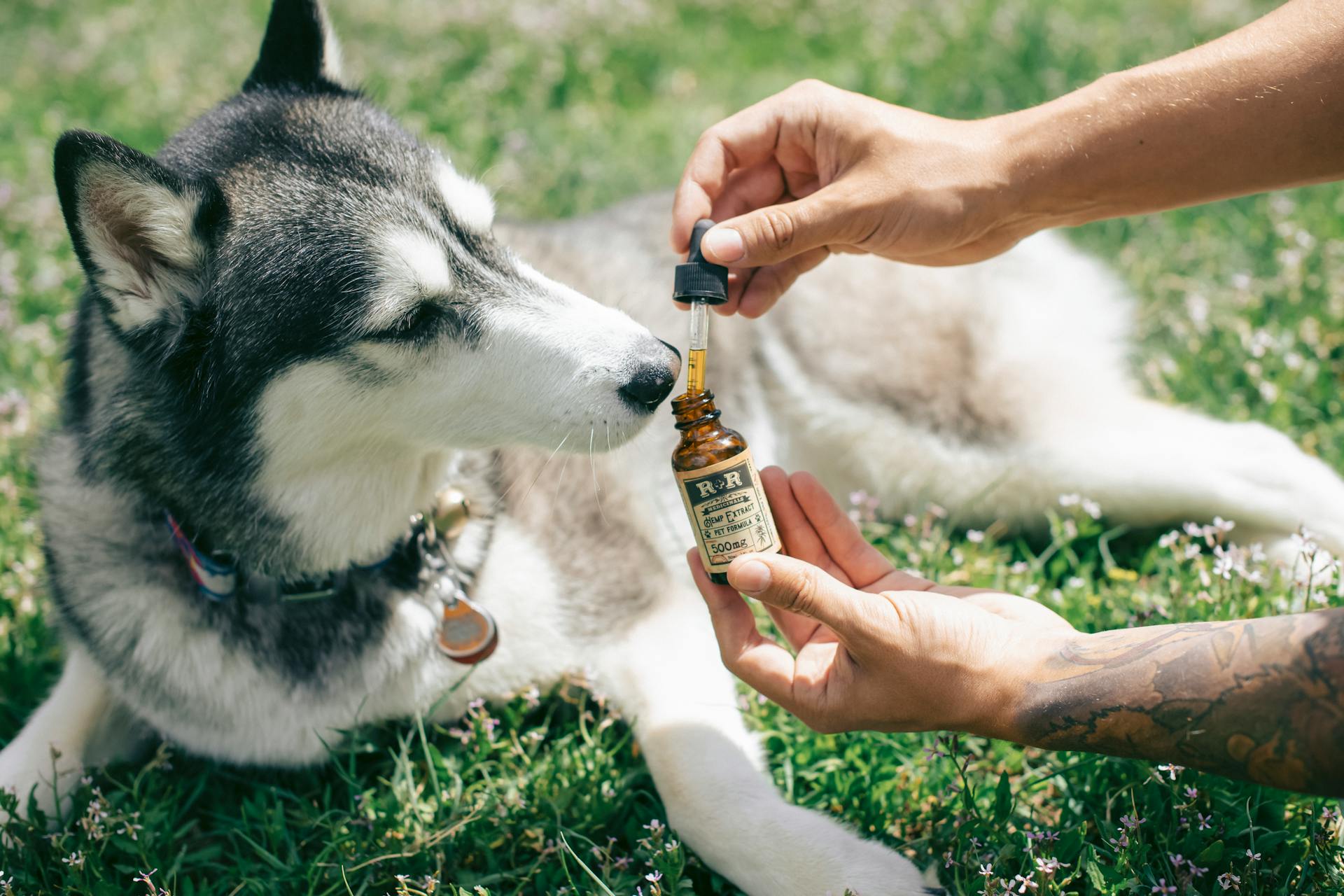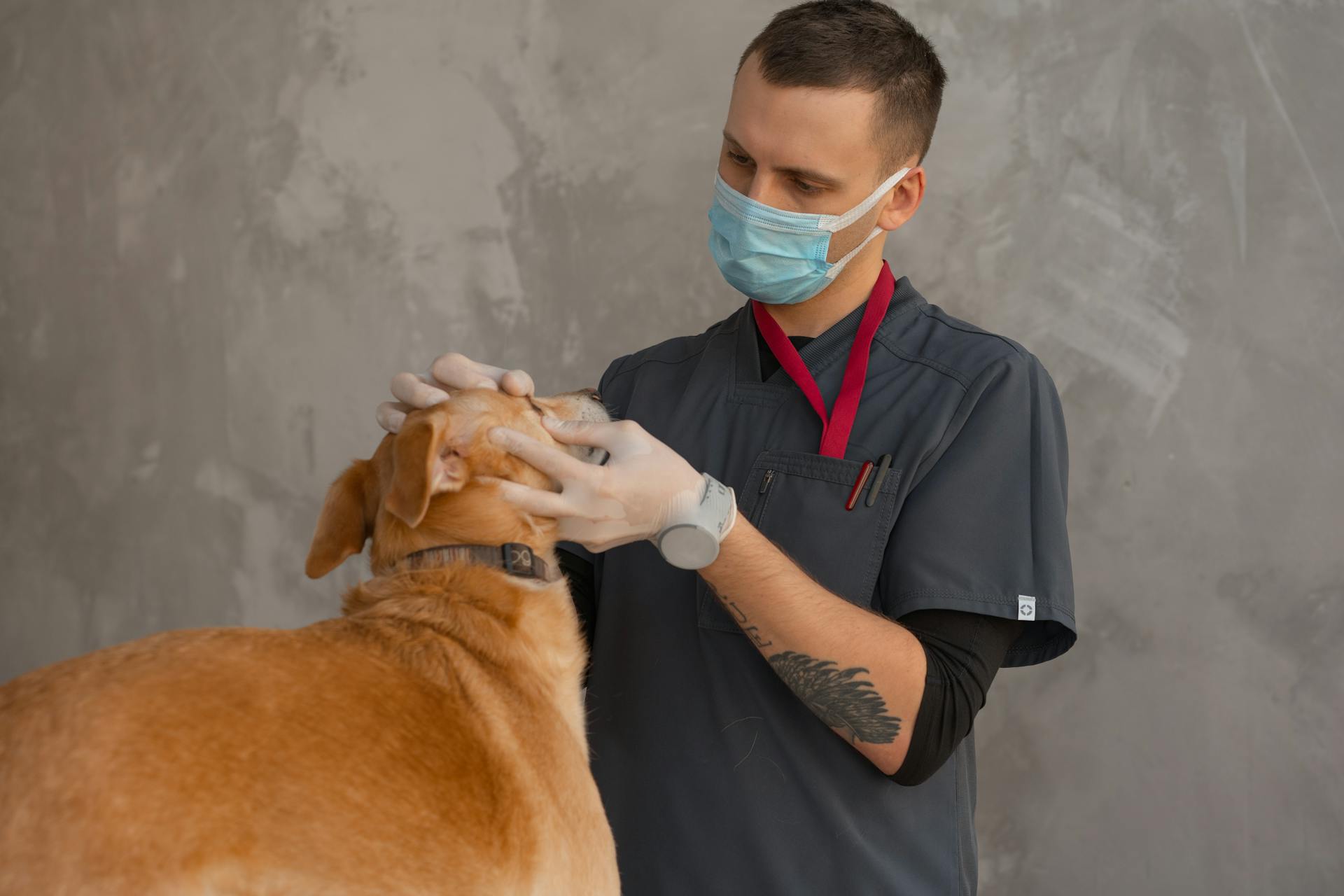
Chronic pancreatitis is a painful and debilitating condition that can severely impact a dog's quality of life. It's a chronic inflammation of the pancreas that can lead to digestive issues and other complications.
Dogs with chronic pancreatitis often experience recurring episodes of pancreatitis, which can be triggered by various factors such as high-fat diets, stress, and certain medications.
The pancreas plays a crucial role in digestion and glucose regulation, making chronic pancreatitis a serious condition that requires prompt attention and ongoing management.
What Is Chronic Pancreatitis in Dogs?
Chronic pancreatitis in dogs can be a serious condition that affects the pancreas's ability to produce digestive enzymes and hormones.
The pancreas plays two pivotal roles in a dog's body, and chronic pancreatitis can disrupt both functions.
In cases of chronic pancreatitis, the pancreas becomes inflamed, which can lead to abdominal pain, inappetence, and vomiting.
Affected dogs may display a praying position to relieve abdominal discomfort.
If left untreated, chronic pancreatitis in dogs can become even more severe and lead to weight loss and lethargy.
Early intervention is critical in helping dogs feel better and preventing worsening of symptoms.
Signs and Symptoms
Chronic pancreatitis in dogs can be a challenging condition to manage, and it's essential to recognize the signs and symptoms to provide your furry friend with the best possible care.
Dogs with chronic pancreatitis may exhibit a range of symptoms, including lethargy, decreased appetite, weight loss, abdominal pain, and vomiting.
Loss of appetite is a common symptom, and dogs may refuse to eat or show little interest in food.
A bloated or hard belly can be a sign of worsening pancreatitis, so keep an eye out for this.
In addition to these symptoms, dogs with chronic pancreatitis may also experience diarrhea, dehydration, and fever.
Here are some common signs of chronic pancreatitis in dogs:
- Lethargy
- Decreased appetite
- Weight loss
- Abdominal pain and/or vomiting
If you notice any of these symptoms in your dog, it's crucial to consult with your veterinarian as soon as possible to determine the best course of action.
Keep in mind that chronic pancreatitis can suddenly worsen, so it's essential to monitor your dog's condition closely and seek veterinary care if you notice any changes.
Diagnosis and Detection
Diagnosing chronic pancreatitis in dogs can be tricky, but veterinarians have several tools at their disposal. A thorough physical exam is often the first step in diagnosing pancreatitis.
Bloodwork can be helpful in ruling out other health conditions, but changes in bloodwork can be non-specific, meaning they can be associated with many different diseases. Blood tests for pancreatic enzymes can help diagnose pancreatitis, but even these tests might not be accurate in all dogs.
A veterinarian may recommend diagnostic testing, such as ultrasound, radiographs, or surgery, to determine the best course of treatment. Ultrasound is often the best diagnostic tool to determine if your pet has signs of pancreatitis.
Here are some common diagnostic tests that may be performed:
- Ultrasound: to determine if your pet has signs of pancreatitis
- Bloodwork: to rule out other health conditions and check for abnormalities in electrolytes and other parameters
- Blood tests for pancreatic enzymes: to help diagnose pancreatitis, but may not be accurate in all dogs
- Radiographs and Ultrasound: to rule out other conditions and show inflammation or other changes in the pancreas
- Surgery: to obtain a biopsy of the pancreas and make a definitive diagnosis
Fine needle aspiration of the pancreas can also be used to look for signs of swelling and infection. A negative test for pancreatic lipase immunoreactivity (cPLI) makes it very unlikely that your dog has pancreatitis, but not impossible.
In some cases, veterinarians may need to begin treatment based on symptoms alone, especially if your dog is known to eat whatever they can find and is vomiting and has belly pain.
Treatment and Management
Treatment and management of chronic pancreatitis in dogs is crucial for their quality of life. Your vet will closely monitor your dog's diet to ensure they're not eating too many fatty foods. This may involve switching to a low-fat or ultra-low fat prescription food.
A bland, low-fat diet is recommended during recovery, which may be a home-cooked and/or home-prepared diet. Your vet may also recommend feeding your dog small meals spaced out over the day. This can help prevent further complications and manage symptoms.
In some cases, your vet may prescribe medications such as cyclosporine, prednisone, or prednisolone to manage chronic pancreatitis. These medications can help reduce inflammation and manage symptoms. Your vet will closely monitor your dog's response to treatment and adjust the plan as needed.
Treatment and Management
Acute pancreatitis requires immediate veterinary attention, and your vet will likely want to withhold food and water for the first 24 hours if your dog can't keep anything down.

Pain medicine and IV fluids may be prescribed to manage symptoms and prevent dehydration.
A low-fat diet is crucial in the long term to prevent further attacks.
Your vet may recommend a prescription food that's low fat or ultra low fat, and you should feed your dog small meals spaced out over the day.
In cases of chronic pancreatitis, your vet may prescribe cyclosporine, prednisone, or prednisolone.
Here are some common treatment and management options for pancreatitis in dogs:
Your vet will closely monitor your dog's condition and adjust treatment as needed, so be sure to follow their instructions carefully.
Causes of
Causes of pancreatitis in dogs can be a real challenge to identify, but understanding the common culprits can help you take preventative measures. High-fat diets are a major cause, especially if your dog gets into fatty foods or table scraps.
A history of dietary indiscretion can also increase the risk of pancreatitis. This means if your dog has a tendency to eat anything and everything, they may be more prone to pancreatitis.

Obesity is another significant risk factor. If your dog is overweight or obese, it's essential to work with your veterinarian to develop a weight management plan.
Certain breeds, such as Miniature Schnauzers and English Cocker Spaniels, are also more susceptible to pancreatitis due to genetic predispositions.
Some medications, including cholinesterase inhibitors, calcium, and phenobarbital, can also trigger pancreatitis.
Here are some common high-fat foods that can trigger pancreatitis in dogs:
- Fatty meats, such as lamb or buttery cookies
- High-fat dog food, especially if fed in large quantities
- Table scraps, including fatty foods or leftovers
By being aware of these potential causes, you can take steps to prevent pancreatitis in your furry friend.
Prevention and Care
Prevention is key when it comes to managing chronic pancreatitis in dogs. To reduce the risk of pancreatitis, it's essential to feed a low-fat, highly digestible, nutritionally complete, and balanced dog food, as recommended by your vet.
Your vet may suggest a personalized diet, including specific treats that are safe to offer. Be cautious with table scraps, as they can trigger pancreatitis. Make sure all household members know to keep fatty foods out of your dog's reach.
Discover more: Vets Dog Treats
A locked trash can or one that's inaccessible to your dog can help prevent dietary indiscretions. Regular veterinary check-ups and follow-up appointments can also help manage chronic pancreatitis.
Here are some potential supplements that may help prevent pancreatitis in dogs:
- Digestive enzyme supplements with pancreatin, which can reduce the work of the pancreas and inhibit pancreatic secretion
- Fish oil, which may help lower blood lipid levels, but should be given in moderation and with vitamin E (5-10 IU) to avoid any potential harm
It's essential to consult with your veterinarian before giving your dog any supplements, as they may not be suitable for every dog.
What Causes?
Pancreatitis in dogs can be a sneaky condition, often striking without warning. Most cases are idiopathic, meaning the cause is unknown.
High-fat diets are a common culprit, especially when dogs indulge in fatty human foods like table scraps. The days after holidays like Thanksgiving and Christmas see a surge in pancreatitis-related emergency vet visits.
Dietary indiscretion is another risk factor, with dogs prone to rummaging through trash or consuming inappropriate items they find during walks or outdoor play. This can lead to pancreatitis, so it's essential to keep a close eye on your furry friend.

Certain breeds are genetically predisposed to pancreatitis, including miniature schnauzers, cocker spaniels, dachshunds, and some terrier and toy breeds. If you have one of these breeds, it's crucial to be aware of the signs and symptoms.
Obesity is also a risk factor, with dogs who are overweight or obese more likely to develop pancreatitis. Maintaining a healthy weight through regular exercise and a balanced diet can help reduce this risk.
Some medications and toxins can also trigger pancreatitis, including vinca alkaloids, azathioprine, salicylates, thiazide diuretics, phenobarbital, potassium bromide, and more. If your dog is taking any of these medications, be sure to follow your vet's instructions carefully.
Here are some common toxins that can cause pancreatitis in dogs:
- Cholinesterase inhibitors
- Calcium supplements
- Potassium bromide and phenobarbital
- L-asparaginase
- Estrogen
- Aspirin and aspirin-containing medicines
- Azathioprine
- Thiazide diuretics
- Vinca alkaloids
Home Care
Home care for a dog with pancreatitis is crucial, but it's essential to remember that this condition should not be self-diagnosed or treated at home. Early diagnosis and prompt veterinary treatment significantly improve the prognosis for this potentially life-threatening condition.
Discover more: Pancreatitis for Dogs Home Remedy

Feeding a specific low-fat food recommended by your vet is usually a key part of home care. This food is tailored to your dog's needs and will help manage their pancreatitis.
Limiting playtime and walks, and letting your dog rest in a quiet place, can also help them feel more comfortable. This is especially true for dogs who prefer to be left alone when they're feeling unwell.
It's essential to ensure your dog has access to water, even if they're having trouble walking or standing. A water bowl should be placed close to their bed so they don't have to move far to get a drink.
Monitoring your dog closely is vital, as you need to call the vet if your dog develops any new signs or if their current signs get worse. This will help prevent any complications and ensure your dog receives the best possible care.
Follow your vet's instructions carefully, even if your dog seems better. This includes taking them for all their recommended follow-up visits and tests, as pancreatitis can happen again.
Preventing

Preventing pancreatitis in dogs requires careful attention to their diet and lifestyle. To reduce the risk of pancreatitis, feed a low-fat, highly digestible, nutritionally complete, and balanced dog food. Many weight-loss dog foods and prescription digestive diets fall into this category.
The ideal diet may vary from pup to pup, so ask your vet for a personalized recommendation, including which treats are safe to offer. Table scraps are a no-no, especially fatty foods. Make sure all members of the home know to keep these out of your furkid's reach.
Preventing dietary indiscretions is also crucial. Take proactive measures to prevent your dog from accessing trash cans, and consider using a lock or making them inaccessible. Follow your vet's recommendations for managing chronic pancreatitis, which may include monitoring via bloodwork rechecks and certain supplements or medications.
Some supplements that may help prevent pancreatitis include digestive enzyme supplements (pancreatin) and fish oil supplements. However, always talk to your vet before giving your dog any supplements, as they may not be suitable for every dog.
Here are some key points to remember:
Remember, every dog is unique, so it's essential to consult with your vet before making any changes to your dog's diet or adding supplements. By following these tips and working closely with your vet, you can help prevent pancreatitis in your furry friend.
Recovery and Prognosis
Recovery from pancreatitis is possible for many dogs, and with proper management, they can live normal lives. However, the risk of another bout of pancreatitis remains high.
Most dogs with mild forms of pancreatitis recover without any long-term consequences, but severe episodes or repeated bouts of pancreatitis can lead to future complications. A dog with severe pancreatitis has a poor to grave overall prognosis, thus a higher risk of loss of life.
Dogs that recover from pancreatitis may develop extensive scarring within the pancreatic tissue, which can lead to the development of diabetes mellitus and/or exocrine pancreatic insufficiency (EPI).
Prognosis and Recovery
Many dogs will fully recover from pancreatitis and go on to live normal, happy lives. However, the risk of another bout of pancreatitis remains high.
The severity of pancreatitis is a major factor in determining prognosis. Dogs with mild forms of pancreatitis tend to recover without long-term consequences.
Prognosis also depends on how soon treatment is initiated and how a pup responds to initial treatment. The sooner treatment begins, the better the chances for recovery.
Worth a look: Pancreatitis in Dogs Treatment Cost

Most dogs with mild pancreatitis recover within a week or two. To ensure their comfort during recovery, it's essential to follow the veterinarian's instructions closely for prescription medications.
A strict low-fat diet, such as Royal Canin Gastrointestinal Low Fat dog food, can be beneficial for dogs with pancreatitis. This can help prevent future bouts of the condition.
Early diagnosis and treatment are crucial for a successful recovery. The sooner pancreatitis is diagnosed and treated, the better the chance for recovery.
Dogs that recover from pancreatitis may still develop complications, such as scarring within the pancreatic tissue. This can lead to conditions like diabetes mellitus and exocrine pancreatic insufficiency (EPI).
Can Be Cured?
Unfortunately, chronic pancreatitis in dogs can't be cured since it's an ongoing and progressive disease.
The good news is that its progression can be slowed or managed with proactive dietary and lifestyle modifications.
In fact, making these changes can help improve your dog's quality of life and reduce the risk of complications.
With the right approach, you can help your furry friend live a healthier and happier life, even if the disease can't be completely eliminated.
Complications and FAQs
Complications of chronic pancreatitis in dogs can be serious and long-lasting. Some dogs may develop diabetes mellitus due to impaired insulin production, requiring daily insulin injections.
A blocked bile duct is another possible complication, which can occur during an episode of pancreatitis. Nearby organs can suffer collateral damage from the inflammation.
Fortunately, exocrine pancreatic insufficiency (EPI) can be treated with supplementation of digestive enzymes. This condition is characterized by insufficient production of pancreatic digestive enzymes, leading to long-term digestive issues.
Potential Complications
Dogs with chronic pancreatitis may suffer from collateral damage to nearby organs, such as a blocked bile duct from inflammation.
During pancreatitis episodes, damage to the pancreas can interfere with the organ's future functioning, leading to complications like impaired insulin production.
Diabetes mellitus can develop due to impaired insulin production, requiring daily insulin injections.
Exocrine pancreatic insufficiency (EPI) may occur, where there is insufficient production of pancreatic digestive enzymes, causing long-term digestive issues.
Fortunately, EPI can be treated with supplementation of digestive enzymes.
Many dogs who develop pancreatitis never experience complications, but early intervention is crucial in mitigating potential long-term impacts on a dog's health.
Frequently Asked Questions
Q: What are the common complications associated with a certain medical condition?

A: People with this condition are at risk of developing complications such as diabetes, high blood pressure, and cardiovascular disease.
Q: Can a specific treatment cause side effects?
A: Yes, this treatment has been known to cause side effects like nausea, vomiting, and diarrhea.
Q: How can I prevent complications from arising?
A: Following a healthy diet and regular exercise can help prevent complications from arising.
Q: What are the warning signs of a potential complication?
A: Watch out for symptoms like fever, chills, and shortness of breath, which can indicate a potential complication.
Q: Can a certain medication interact with other medications?
A: Yes, this medication can interact with other medications, such as blood thinners and certain antibiotics.
Q: How can I manage my condition to prevent complications?
A: Keeping track of your medication schedule and attending regular check-ups with your doctor can help manage your condition.
Take a look at this: Pancreatitis in Dogs Blood in Stool
Frequently Asked Questions
How long can a dog live with chronic pancreatitis?
Dogs with chronic pancreatitis can live a normal lifespan if managed properly and secondary conditions are well-controlled. With careful management, many dogs can reach their breed's average life expectancy.
Sources
- https://bondvet.com/b/pancreatitis-in-dogs
- https://www.pethealthnetwork.com/dog-health/dog-diseases-conditions-a-z/chronic-pancreatitis-dogs
- https://www.webmd.com/pets/dogs/dog-pancreatitis-symptoms-and-treatment
- https://www.akc.org/expert-advice/health/pancreatitis-in-dogs/
- https://www.petmd.com/dog/conditions/endocrine/pancreatitis-in-dogs
Featured Images: pexels.com


